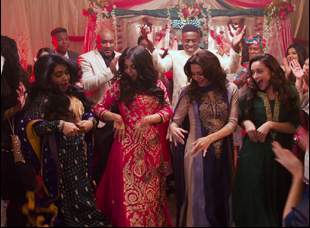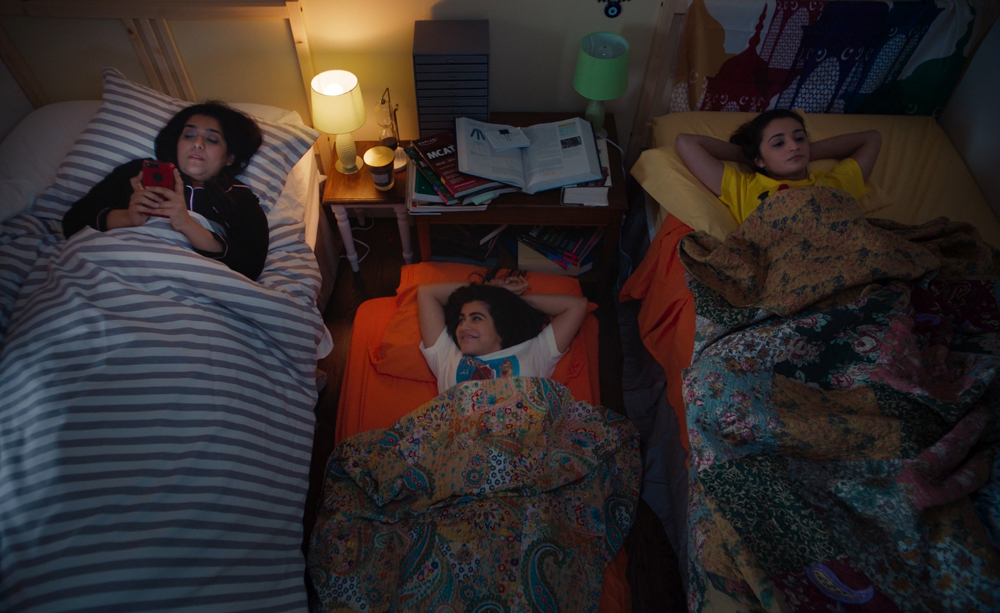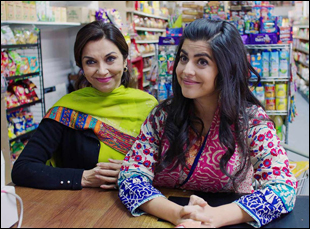“Everyone is going to get what they want – this is America, the land of dreams,” exclaims Ameera (Shenaz Treasury) upon her arrival in Jackson Heights in “Americanish,” the sight of Queens seeming about as glamorous to her as she appears all decked out after leaving India in Bollywood-level regalia. She may have stars in her eyes, but a glance outside can’t prompt much more than a shrug from her cousins Maryam (Salena Qureshi) and Sam (Aizzah Fatima), who are too busy studying for medical school or handling social media for a prominent politician (George Wendt), respectively, to take notice. However, all are required to look around as they feel the pressure to get married as Muslim women in their twenties and early thirties in Iman Zawahry’s engaging romantic comedy and can be heartened by seeing the world through each other’s eyes now that they’re all under one roof.
There’s a bit of Jane Austen in “Americanish” as a necessity to get hitched rears its ugly head to keep up appearances in the community, but the demand isn’t coming from Khala (Lilete Dubey), the mother to Maryam and Sam who takes Ameera in, having been unceremoniously dumped by her husband who had hoped after settling in America, she would be more attentive to his needs. Clearly, Maryam and Sam have been raised not having to depend on anyone, yet both have potential suitors as they weigh the progress they want to make in their careers against the traditions of their culture and the desire to start families of their own, with Ameera’s infectious enthusiasm to find a husband potentially tipping the scales. From a sharp script co-written by Zawahry and Fatima, “Americanish” explores a spectrum of female experience across the South Asian diaspora as each of the women, including Khala, want different things out of life and go about getting there in varied ways, all inspired by one another in the paths they’ve chosen for themselves.
As the film makes the festival rounds, recently making its Los Angeles premiere at the L.A. Asian Pacific Film Fest before heading across the country to stops at the Heartland Film Fest in Indianapolis and the Woodstock Film Fest in upstate New York, Zawahry and Fatima were joined by two of the film’s producers Paul Seetachitt and Roy Wol, to discuss how the film grew out of a sense of community and being able to enable others to see themselves on screen for the first time with this charmer.
Iman Zawahry: Aizzah has been doing this amazing one-woman show for 10 years and I happened to be in New York city on a food tour and we passed by the famed Cherry Lane Theater. I saw the poster of the play and I was like, “This is the most amazing thing ever,” so I go in to watch it and I laughed, I cried, I got up to holler. And I was like, “Wow, I can’t believe I’m seeing myself on stage.” I was a short filmmaker myself at the time, so I reached out to Aizzah and I was like, “Hey, let’s make this into a movie.” And then eight years later, here we are.
Aizzah, from what I’ve heard, this involves significantly more characters on stage than made it into the film ultimately. How did you find the focus?
Aizzah Fatima: Yeah, the other characters didn’t quite fit into this narrative because we were trying to focus in on the younger generation and then the older, but it took us a long time to get to these characters. We kept writing and rewriting for about five years and the script kept changing a lot. In the beginning, it was very much like the play, [with] standalone stories, more like “Love, Actually,” and more characters and it wasn’t until a few years in, we changed that structure and we made them sisters and the cousin and the mom when everything came together.
The dynamic between the three women really informs each other. Was it interesting to figure out the full spectrum of experience within these four characters?
Iman Zawahry: What’s really interesting is on the page, it was there, but it wasn’t really there until we got these actors on the screen together. The way that they connected, the chemistry that they had together, it just really popped, and I think that’s how we saw the through line of them really coming together because there was a point Maryam and Ameera never really felt like they overlapped on the page, but on screen, they connected really well and Aizzah and Salena’s sisterly bond was just so strong. It was really the actors that brought it to life.
Iman Zawahry: Yeah, we had amazing casting directors Mia [Cusumano] and Meghan [Rafferty] in New York and we held auditions. I’m going to say discovered Salena [Qureshi], who was Maryam, and then Godfrey [who plays Gabriel, a bodega owner who Ameera takes an interest in] came in, and he made a joke because he doesn’t usually have to audition, but he auditioned for us and he’s like, “I’m not auditioning again, Iman.” [laughs] And then for Kapil [Talwalkar], who played Shahid [Maryam’s love interest], he’s actually an LA-based actor and that was a role that we took some time to find, so we dug into that and then it was a dream to get Lillete [Dubey]. She’s a Bollywood legend. Actually, who suggested Lillete?
Aizzah Fatima: It was our casting directors, but the minute they suggested her, I had grown up watching Lillete, so I was like, “Yes.” Honestly, it was amazing when they were like, “Yeah, she’s interested, but she wants to read the script.” We were just floored. And then she came on board and was a dream to work with.
Iman Zawahry: An absolute dream and what’s also amazing about that is she loves to work with first-time female film director and she was such a joy. Then Shenaz [Treasury] also was Indian-based, so we had Skyped with her and she related to the film’s origin and she’s actually Ameera in real life. Yeah. That’s how the team came together and they really found themselves [as a family] through rehearsals. I did not get to rehearse with them because they came from India. I only got to rehearse with Aizzah, Kapil and Salena, a little bit before, just for one day.
Aizzah Fatima: One day.
Iman Zawahry: It was just crazy, but once they all were in the space, they came together as a family because they all have authentic personal experience of what these stories are. That’s what’s really helped, and what’s incredibly important is to cast people from the societies that they’re representing, which has always been a historically big problem in Hollywood. We were trying to stay as authentic to everything as possible, and Aizzah always says this, which I really appreciate, “We are very specific in our storytelling.” And the more specific you are, the more relatable the experience is. I never thought that until I saw all the audience’s reactions, but it’s been incredible.
Aizzah, it’s interesting that you seemed to choose the most thankless part of the three younger women when as the originator, you likely had your pick of the parts. How did you decide who you’d play?
Aizzah Fatima: It’s so funny how that came together. We were writing for years and in the play, I play all the characters, so I was like, “Look, I can play any of them. I’ve been doing it for so many years.” And I was always like, “Okay, I’ll play Ameera,” because she’s funny and I do comedy. It just makes sense.” But then, when it got closer for us [to make the film], we tried to get really big name actors to play Sam and it didn’t work out. When that happened, I was like, “Look, I really want to think about my own career trajectory, where I’m always speaking with an accent in the film and TV work I do, but I speak multiple languages, and with a hijab, without a hijab, it’s always that kind of narrative, so I thought I shouldn’t pigeonhole myself.” We had a chat about this and I was like, “I know we always said I would to play Ameera, but I think I should really play Sam, the older sister.” Iman was really gracious and she was like, “Yeah, great. Let’s do it.” And Shenaz had just done “The Big Sick” and was also based in New York, so I had a lot of friends in common with her and I knew this was her. There are actors who play different characters, which is something I do a lot, but then there are also actors who just play themselves, and I feel like Shenaz for us, was that, which was great.

Aizzah Fatima: It was not easy. A lot of permits, a lot of phone calls…
Paul Seetachitt: It’s always hard to shoot in a big city like New York without a lot of money. Ultimately we relied on the community to help us out. Ann [Chaudhary], our executive producer, was instrumental.
Aizzah Fatima: She’s really connected to the community in Jackson Heights and able to get us a lot of locations. Then it was just a lot of luck and hard work.
Iman Zawahry: We relied on our friends. [For instance] ot’s really hard to get extras, especially because we’re not paying you, so getting people there was very challenging for us, but it ended up becoming, everybody was like, “Hey, I want to be in a movie.” I had 10 friends from Florida fly up and they were in the engagement scene. Ann’s entire family was in the wedding scene. And of course our amazing producers that made it happen.
Paul Seetachitt: And me. [laughs]
What’s it been like to start getting this out into the world?
Iman Zawahry: Aizzah and I have been firsts all the time — I’m one of the first hijabi filmmakers and she’s one of the first doing one-woman shows. This is what we are known doing, and this is the first American Muslim rom-com, made by diverse Muslim women, so we knew that [going in], but we just didn’t realize how much it connected to everyone, especially first-gen immigrants. They talked to us, tearing up about how important it is to see this. All this is really mindblowing and I’m just incredibly grateful, because it’s been so difficult. It took eight years of my life, so it’s very fruitful to have it this way.
Roy Wol: We’re all excited obviously, and [with] the mission that Aizzah and Iman have been leading for many, many years, what I didn’t expect as a co-conspirator is the incredible breakout the film has become. We can’t mention all the festivals that we’re in just yet, but between today and mid-November, we have more than 15 lined up and it’s really interesting that the festivals have been quite diverse. We’re able to address all kinds of communities and we have a remarkable amount of intersectionality in our movie.That’s why I think it has such legs in how it reaches people. It’s also behind the camera too. Really, it’s been very inclusive.
Aizzah Fatima: We made a conscious effort — everybody was recommending male [cinematographers] and Iman was really good about [saying], “No guys, give me a woman.” And once we got Chloe Weaver, an amazing DP who so much credit goes to her because she made this freaking film happen [on the schedule we had], then we were like, “Let’s build a diverse team around her too.” She started recommending [other people for the camera department], ACs and grips and this, that and the other. We were able to get a really great crew together.
“Americanish” Opens on October 6th in select theaters across Southern California and Arizona before a nationwide release on November 14th.





